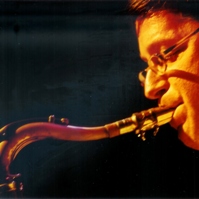
Steve Griggs - Reviews
Jones for Elvin - Volume 1
CD review by Jason West from AllAboutJazz.com (November 1999)
Imagine yourself stepping out of an old barn-turned-music studio and into a lush, green pasture surrounded by Evergreen trees. The early afternoon sun is high overhead—it’s a clear, spring day—and you’re about to record your first CD as a leader. Sitting next to you is one of the world’s most admired jazz drummers, Elvin Jones. He flips through your charts and asks you to sing some of the melodies. You do and moments later embark on the most memorable musical experience of your career.
"Playing with Elvin was like coming home," says Steve Griggs without hesitation. On May 19, 1998 the Seattle saxophonist/composer—whose unique talents are sure to influence scores of players and composers fortunate enough to hear his music—and a group of local musicians including trumpeter Jay Thomas, guitarist Milo Peterson, and double bassist Phil Sparks recorded with Elvin Jones for the first of a three-day session at Bear Creek Studios in Woodinville, WA. Vintage microphones were used to record onto two-inch analog tape. The quintet itself played together in the Bear Creek’s spacious mainroom, unhampered by sound-isolation booths, allowing for optimal interaction among the musicians. A small group of friends and relatives, including Elvin’s wife Keiko, attended the sessions. In the spirit of their favorite Blue Note recordings, producer Griggs and engineer Joe Hadlock ran this session as intimately as possible, keeping distractions to a minimum and giving the musicians every opportunity to lift the music from the page and make it sing. The result: Jones for Elvin sings, and as the title suggests, it definitely swings. Its nine songs are studded with melodic and harmonic jewels set off by Elvin, the rhythmic centerpiece.
At 72, Elvin Jones’ legacy is well established. A summary of his career would take more room than is available here. More than once his drumming has changed the course of jazz, most notably as a member of John Coltrane’s groundbreaking quartet.
"He would sweep his brush across the (snare drum) head for the whole bar and it felt like a wave coming up on the beach," says Griggs in reference to Elvin’s playing on Ellington’s "In a Sentimental Mood," captured in one sensuous take.
Jones’ brushwork, his rim-shot accents, the bearhug rumble of toms, ubiquitous cymbals that crash like affirmations, his transcendental growl—it’s all here. Listen to his time-feel on the title cut; how Elvin swings. Such stuff defies description.
Great artists demand great themes to improvise upon, and Griggs’ compositions prove fertile ground. "I try to write from emotions," Steve relates. "Sometimes I write from theory or rhythm, but usually it’s a matter of living with a mood or an emotion and trying to figure out what that sounds like."
Sounds like the crazy-legs blues of Jay’s Maze—that find the Thomas in his element, and climax with a Griggs/Jones energy duet; the cyclical triplet-pull of Sparks; the me gusta Latin/swing propelling You’re the Berries—these sounds, to name a few, jump out. Rich ensemble parts pairing the blue and green tone of Griggs and Thomas’ horns texture every tune.
My personal favorite—and the sincerity of this music encourages the personal—is a waltzing lullaby written for Steve’s wife, Doris, entitled Healing. During the tenor solo, there is a moment when the moonlit, andante tempo is sliced by lightening arpeggios, rapidly illuminating chord tones that modulate through six or seven different scales, and are resolved pianissimo in a single, whispered breath.
If there’s an underlying theme of Jones for Elvin, it’s friendship’s noble thread. Every member of the quintet is honored with a song (Milo’s Mellifluous Milieu sounds like its humorous, cantering title), and ultimately those of us who listen well are honored, too, with beauty, intimacy and surprise ‘round every chorus. Music can impart valuable lessons, and given the chance, many of us will learn these tunes intuitively and sing them for our friends, just as Steve sang for Elvin on that sunny day in May.